If nothing else, Dune: Spice Wars – out in early access tomorrow – definitely feels like reading Dune. Aside from a few, pretty limited tooltips (along the lines of “consider harvesting Spice” – yeah, no kidding), there’s no real tutorial in Spice Wars’ early access version, and so your first game will feel a lot like opening up Frank Herbert’s first chapter. What’s going on? Who’s this guy? What’s that mean? Did my ebook download some kind of bugged version that’s missing the first hundred pages?
Puncture that layer of surface cloud though and there is something good here. Not of the swelling gravity of Villeneuve’s film or the oddness of Lynch’s. And not of mythically all-spanning, political, religious, philosophical-and-everything-else nature of the books either, of course. And not something that’s likely to kick-start a platform-defining genre like Dune 2: Battle for Arrakis famously did with the RTS, back in 1992 either. But it’s good! And for early access, good is generally enough.
There are four factions to choose from, Atreides, Harkonnen, Smugglers and Fremen, and naturally just the one map of Arrakis. You’ll play as a faction leader, Duke Leto for Atreides for instance (no sight of young Paul), and then pick a couple of assistants from a small list of four, who effectively embody some faction passives but do nothing else that I can discover – it’s nice to have a little control there though, a bit like choosing a civilization and then one of multiple leaders within that, in Civ. After that, you’re away. You have one main base city that can defend itself well, and then there are a few dozen regions to fight over, each with a neutral village that must be captured for you to gain control, and most – but not all – with some kind of important resource attached.
The most interesting thing here is how Dune: Spice Wars actually plays. It’s a kind of 4X-RTS hybrid. 4X insofar as it’s an overworld-style map split up into fixed regions with fixed location settlements to expand to, resources to exploit, uncharted territory to explore (with those lovely thrumming Ornithopters, arguably the best of Dune’s wonderful array of heavy industria), enemies to exterminate – plus overarching systems of diplomatic voting, tech trees and the rest. RTS insofar as all this strategising literally happens in real time, no turns or hex grids, but still a pause and fast-forward option for thinking things over.

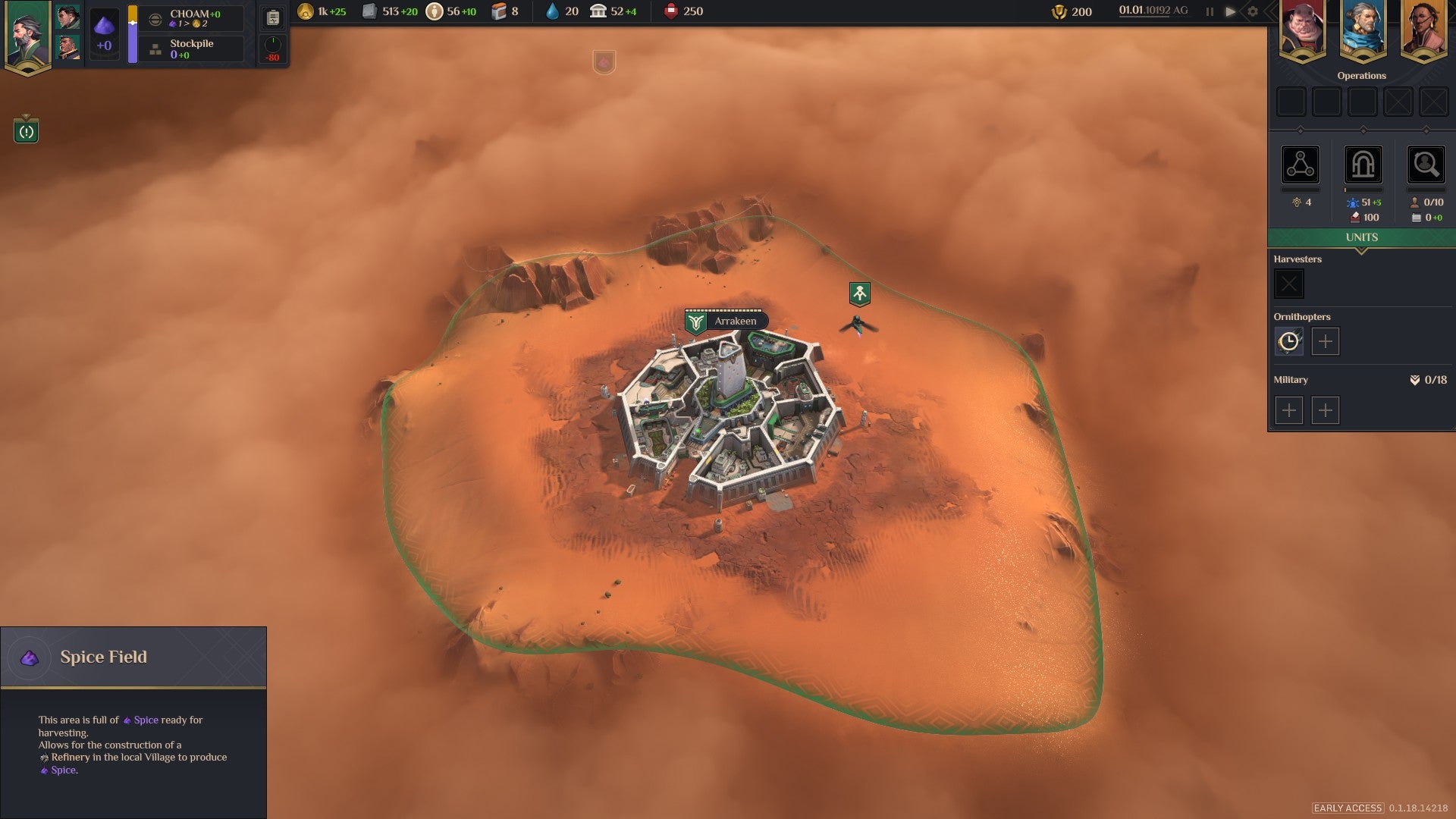
It’s a lovely mix, capturing above all the weirdly oppressive, claustrophobic tension of a galaxy-sweeping drama. Arrakis is a very small map as far as 4X games go, made to feel even smaller by some regions of high winds or deep desert that are simply impassable with regular units, blocking access to your enemies’ lands like the oceans of a Civilization game would before you’ve unlocked some tech like astronomy or naval orienteering. On this tiny little planet half the galaxy seems to have descended, scrabbling about in desperately close proximity for one magic resource.
Arrakis’ most identifiable features are also nicely done. Most land-based units can trigger a sandworm attack by walking on deserts beyond the small borders of a region’s city or village, where you’ll get a brief warning notification for a few short seconds and the ground starts to shift, before a big horrible gob pops up and engulfs whatever you left in the vicinity. This goes the same for your Spice harvesters, which physically appear on the map once you’ve captured a village with Spice in the region and constructed the right building. You can set these to automatically recall whenever trace of a worm is picked up, at the cost of them producing a bit less spice, and given just how many I lost at the start of the game I would strongly advise you just take the hit. Once you have three or four of these on the go, and troops moving around, it’s far too easy to switch off for a second too long and have to construct one all over again – especially with no keyboard shortcuts that I could find in the UI to quickly snap you to the one in trouble.
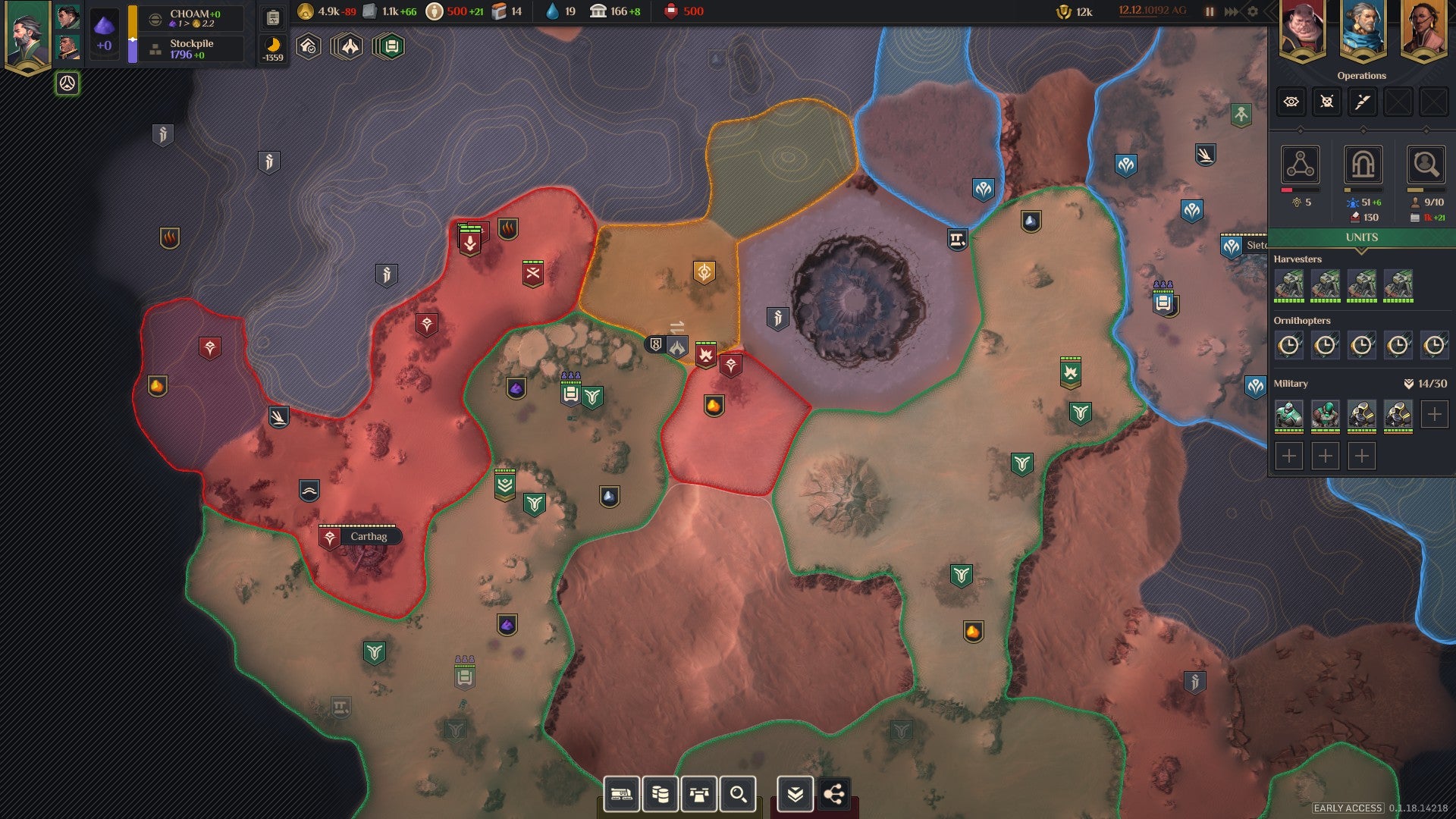
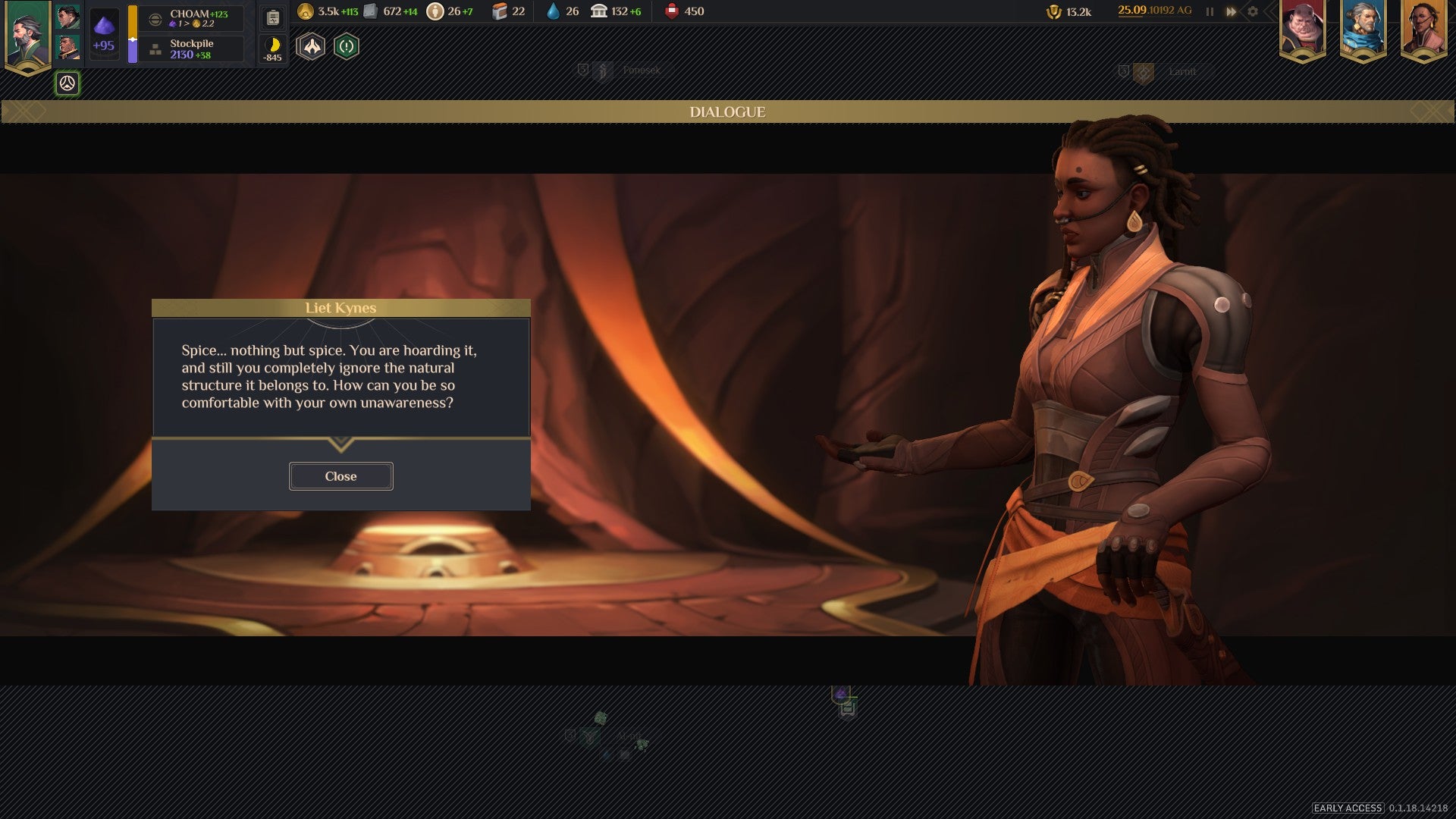
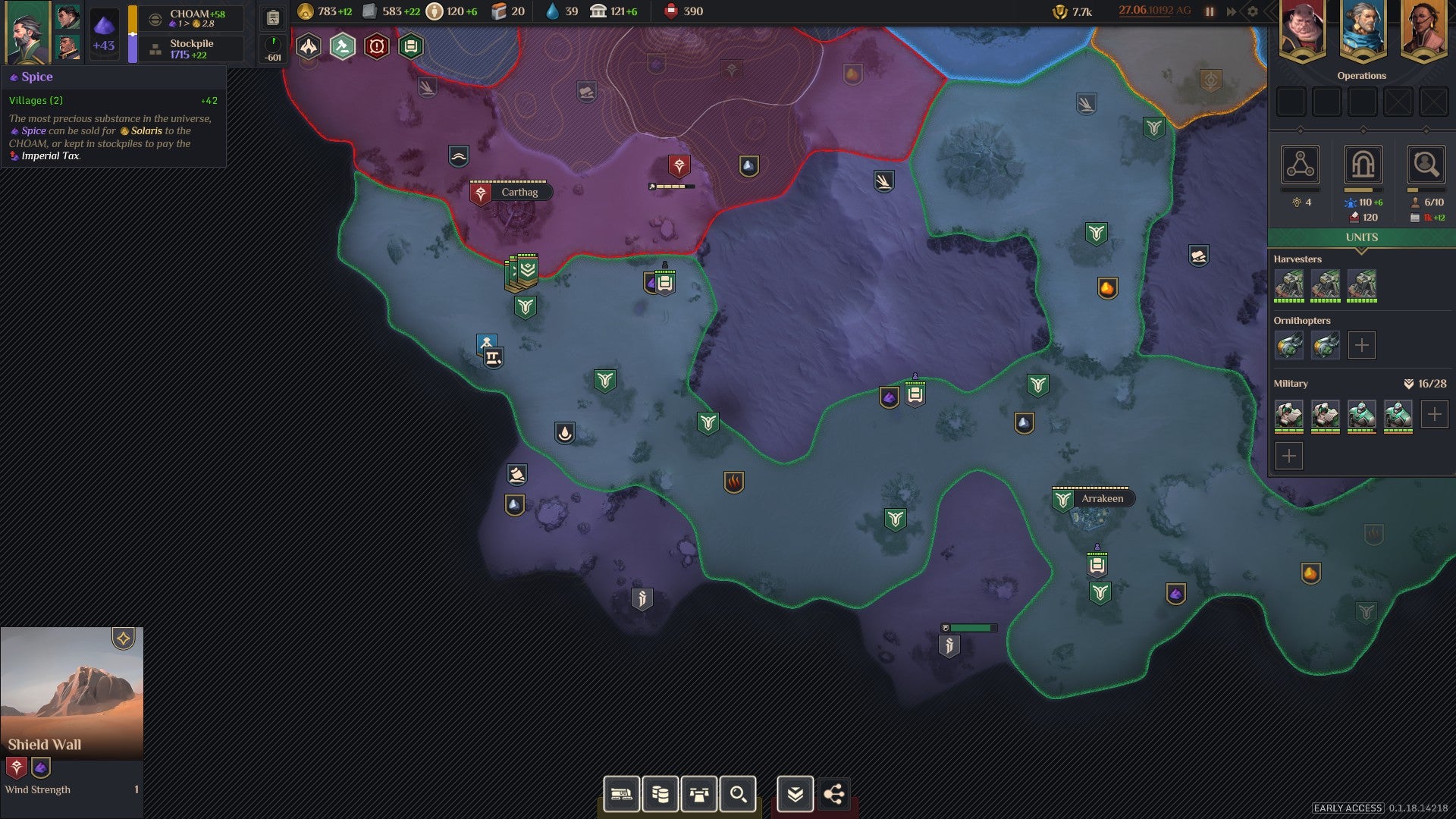
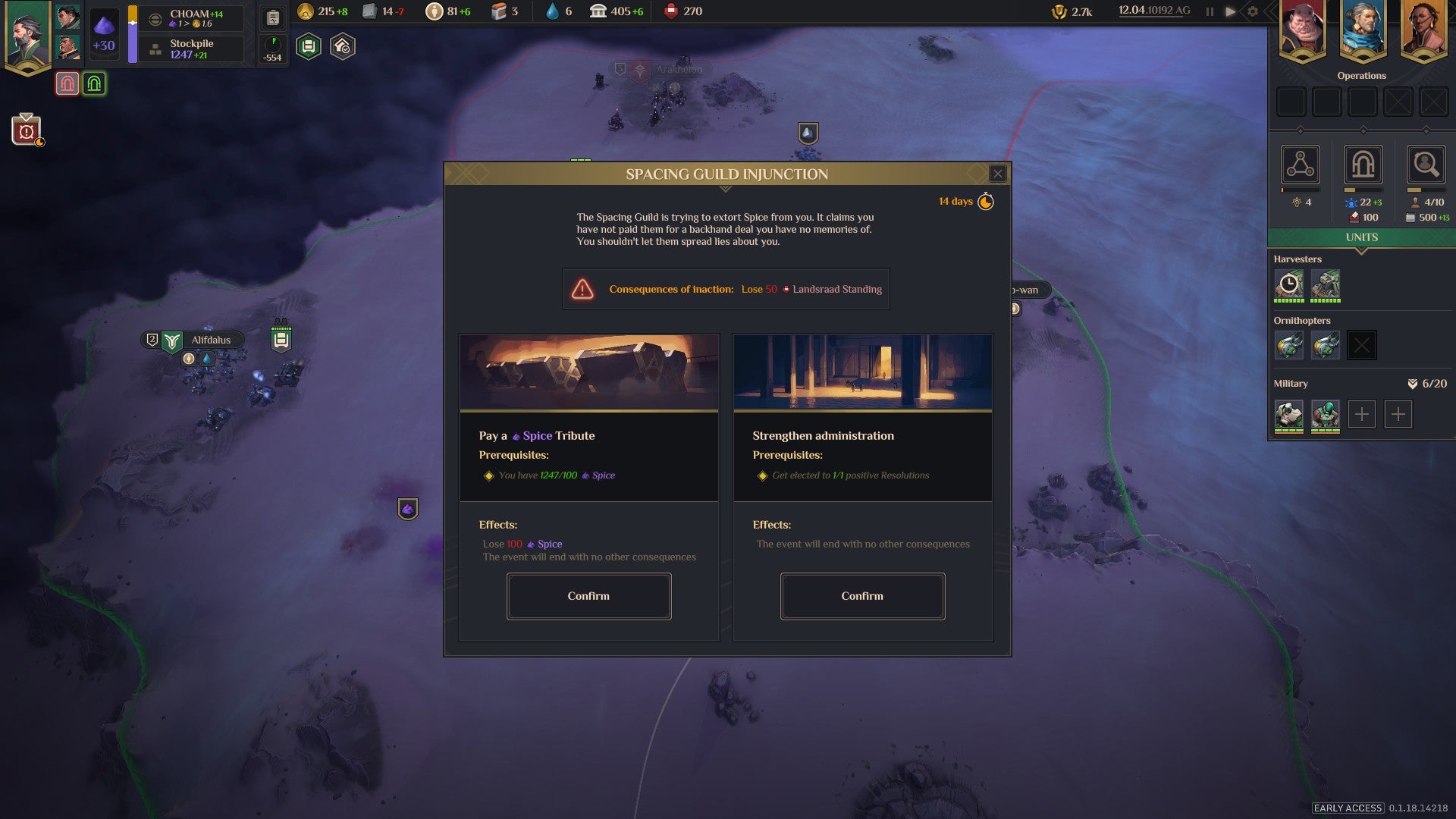
Quickly, it becomes obvious that what matters in Dune: Spice Wars is the ability to juggle everything that’s going on. That’s standard for people familiar with RTS games – the balance between ‘macro’ strategy and ‘micro’ management and actions-per-minute – but when mixed in with 4X it’s a different kind of skill. A sandworm’s popping up next to your army, which already needs manoeuvring so that your ranged units are caught up in an enemy’s melee charge, and might be running out of Supply, essentially a kind of unit-oxygen that drains when you’re outside friendly territory and rapidly kills them off once empty, if you can’t get them back to a base – then a council vote’s happening, someone’s used subterfuge to start a rebellion in a village, the Harkonnens are at it on the far boarder. It’s a heady mix of fast and slow-paced thinking, studying the 4X tactics of espionage and deciding how, or if, to spend your precious council votes, while also commanding troops in the moment-to-moment.
It’s a challenge at first, but I suspect few Dune fans would have it any other way.
Those other layers are good, if not great, additions as well. Espionage is a little confusing at first – most things are in Spice Wars; it really does need a proper tutorial – but actually quite sophisticated once you get it. Agents are periodically earned over time, and can be assigned to different tasks – spying on a specific faction; counterintelligence; spying on specific things like the council or different space-trade organisations whose names I won’t pretend to remember. You earn intelligence over time, which is then used to spend on missions – missions require you to have a certain level in certain things that you’ve been spying on, I believe earned by just having more spies focusing on that organisation. So the Supply Drop mission, which allows you the one-off ability to drop some health and Supply to units (maybe those trying to cross that deep desert…), requires you to have at least one intelligence level in the Spacing Guild. Those missions are then ‘activated’ as Operations – as in, when I choose to actually drop in that supply. It’s a little complex – maybe unnecessarily complex, really – but in a way that all adds to the fun of what espionage is about.
It’s similar for diplomacy – there’s a fairly typical trading screen, and then the Landsraad Council. This is a periodical vote between three seemingly randomly-chosen policies that are thrown up each time, that can do things like increase the cost of unit production for a specific faction, or grant access to some special units. You cast votes, which regenerate fully each time, and another resource called Influence, which is earned at different rates, to influence the outcomes – some of which can even win you the game. I won by voting myself in as Governor of Dune when I had the chance and nobody ousting me for 25 minutes.
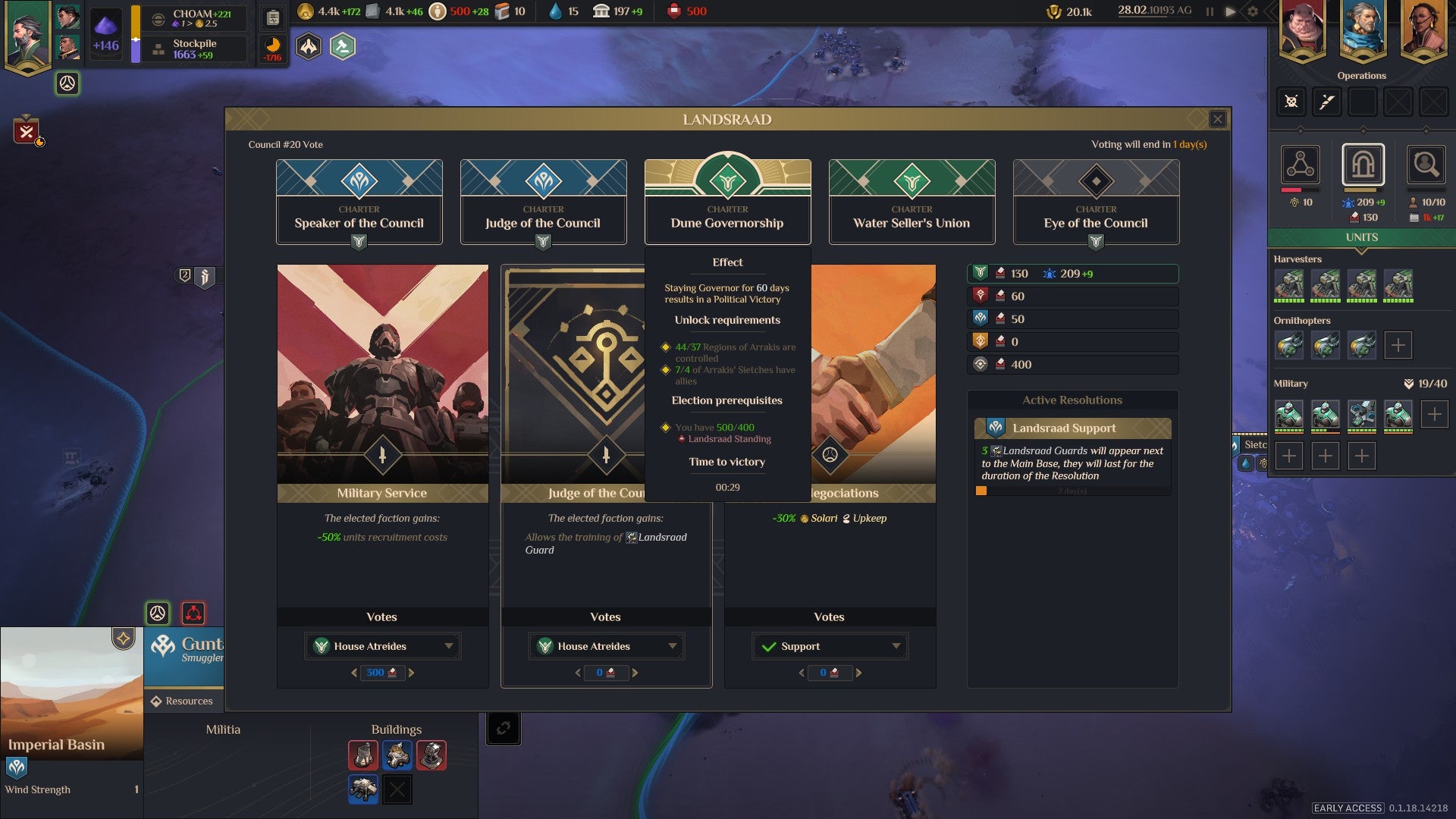
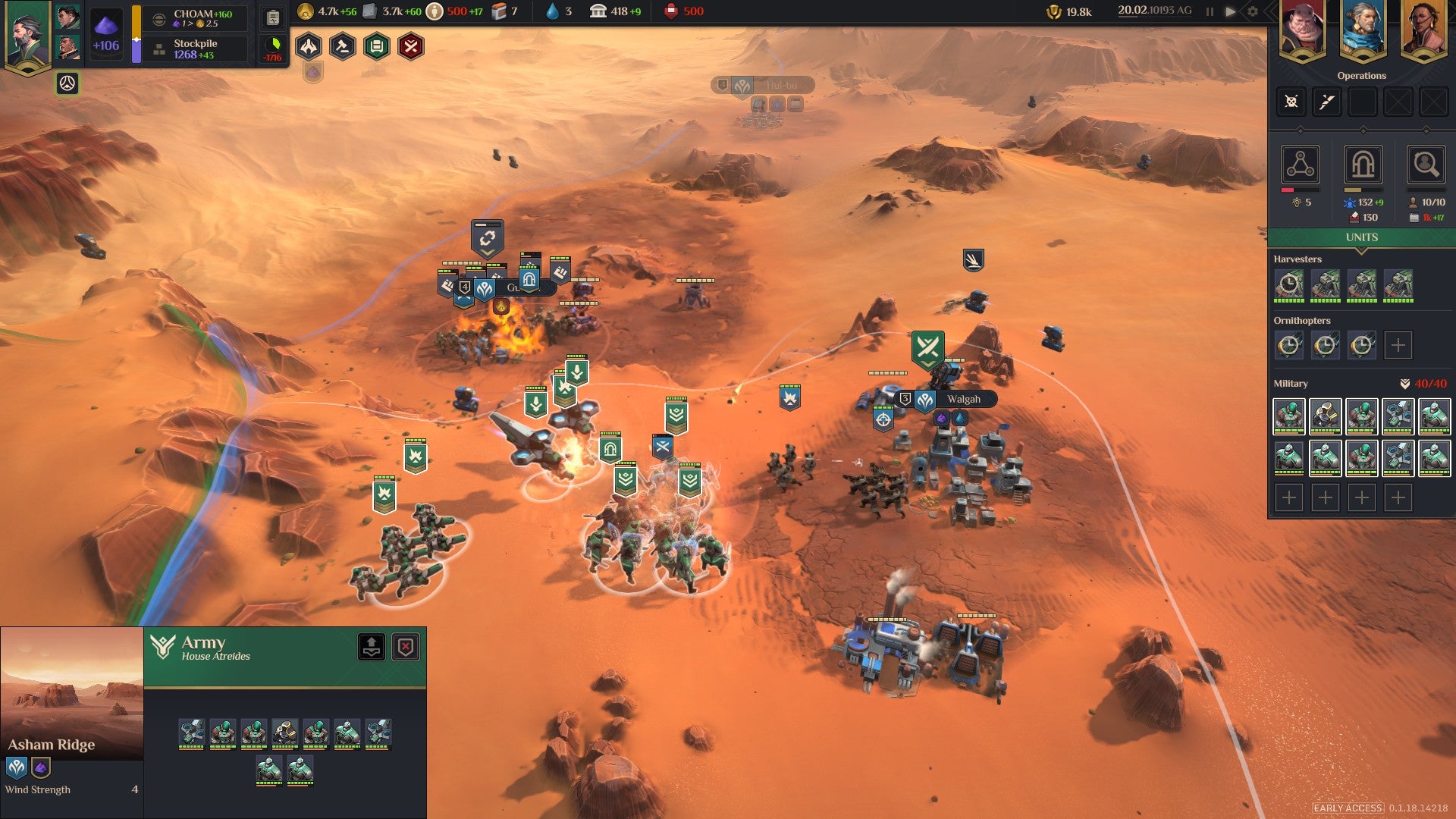
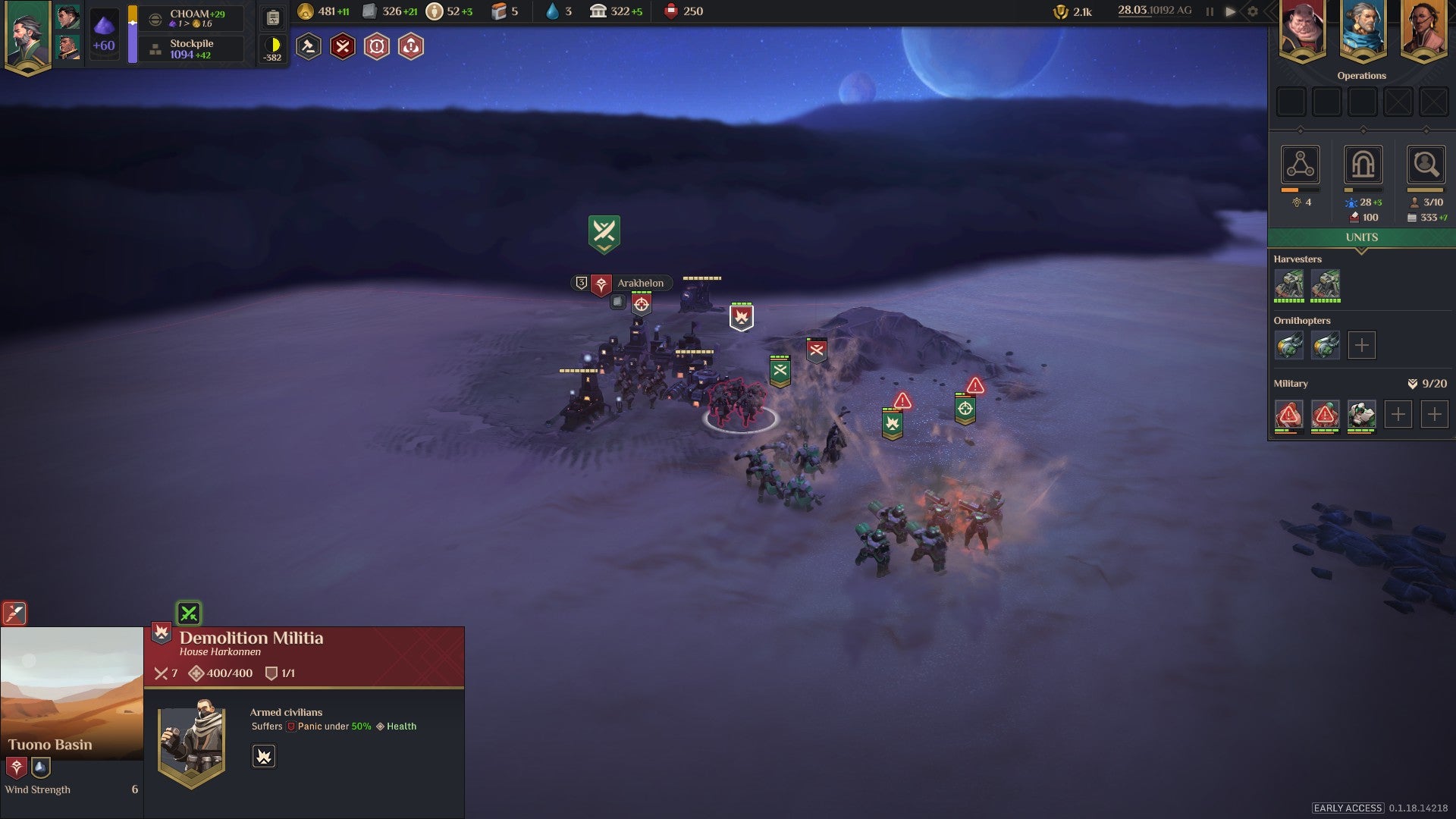
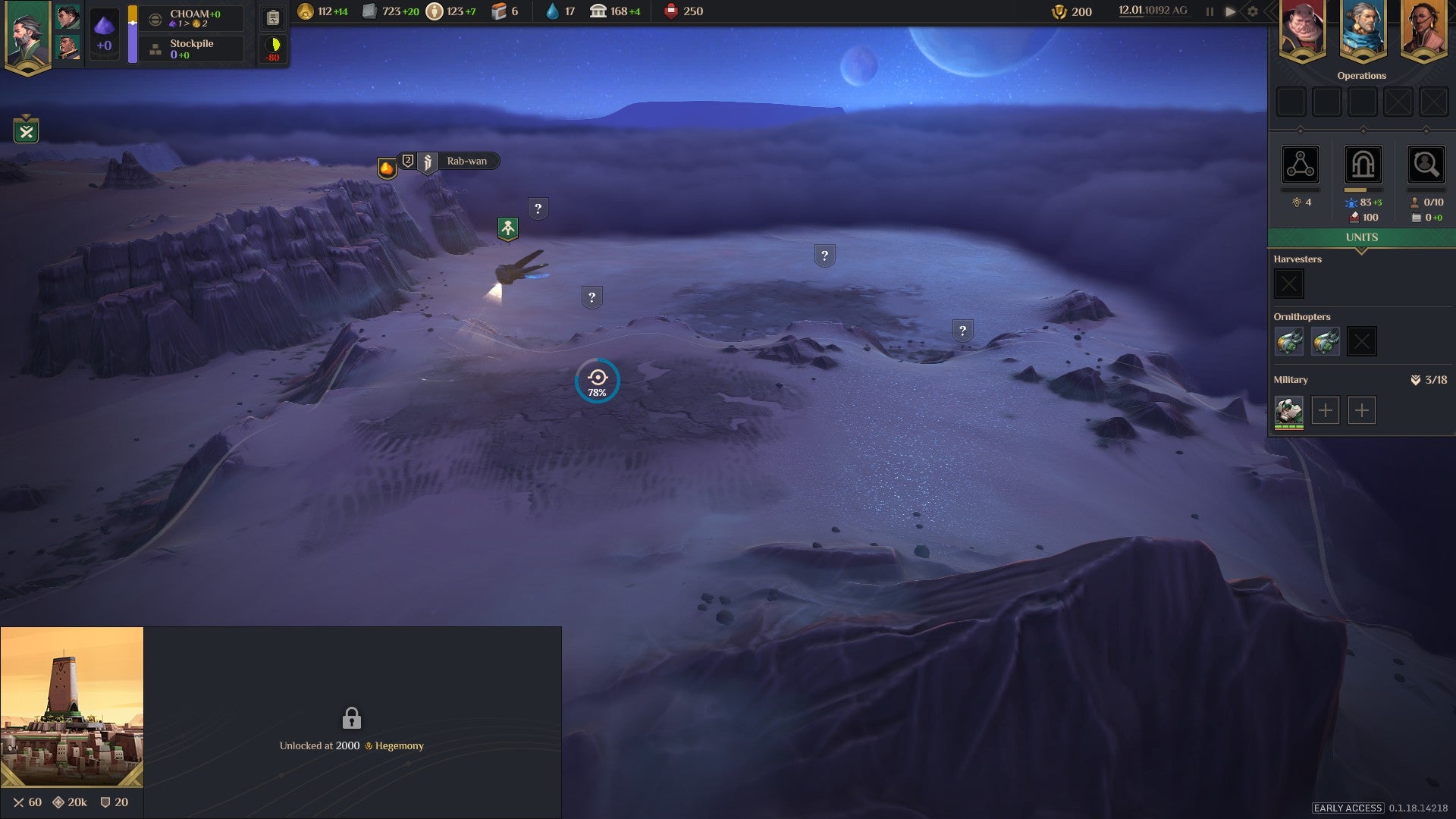
All of these things intertwine in that lovely 4X fashion, of course. Tech tree advancements, for instance, seem to happen at a fixed speed, so it’s more about choosing how to spend your time on advancing it. There are four trees – economic, military, intelligence and a bit of a general ‘other’ one – and so you’re effectively building your faction’s specialism as you go. That said, I put almost the entirety of my focus on military and economic advancements, only to be decisively behind my main rival on both in practice, while winning the game using my vote-winning Influence – which they had far more of and I hadn’t been thinking about at all.
That’s probably the main sticking point at this very early moment with Dune: Spice Wars. The AI isn’t brilliant, with barely a trade offered for the whole game and, on medium difficulty, after the early game barely a real attack thrown my way beyond some defensive battles and enemy-caused revolutions here and there. It’s also still a little bit foggy. I didn’t know what the actual win condition was until I started poking around the “Hegemony” part of the resource bar halfway into my game – basically a race to 25,000 points – and then voted my way to a sneaky finish in the council.
Still, foggy is certainly Dune alright, and all the little things are where you find the magic with these games anyway. Balancing how much spice I keep in reserves for tax and how much I sell to CHOAM, what troops I surprise-airlift to where, which local tribes I befriend and how I get across that damn desert. It’s a challenge at first, but I suspect few Dune fans would have it any other way.


